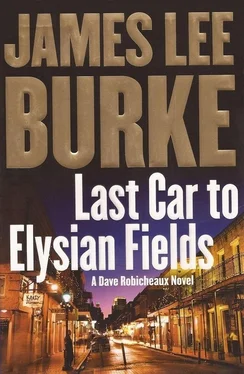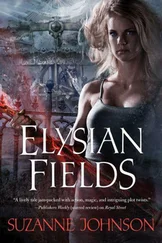He was unshaved, the whites of his eyes shiny with a yellow cast, as though he had jaundice, a sour odor emanating from his clothes.
“Say it,” he said.
“May I come in?” I asked.
“Suit yourself,” he said, and walked deeper into the house.
We entered a large, cheerless room with an unlit gas log fireplace and dark paneling on the walls and windows covered by thick velvet curtains. Track lights on the ceiling were focused on a huge gun case that was filled with both modern and antique firearms.
“That’s quite a collection,” I said.
“Get to it, Detective,” he said.
“Somebody waxed Leon Hebert last night. Somebody who really had it in for him.”
“That breaks me up.”
“You own a .38 or a nine-Mike?”
“A what?”
“A nine-millimeter.”
“Yeah, a half dozen of them.”
“You drive your pickup truck last night?”
“No.”
“Where were you last night?”
“Home, with Mrs. Parks. And that’s the last question I’m answering without my attorney being present.”
We were standing no more than one foot apart. I could see the fatigue in his face, the sag in his skin, the manic shine of grief and anger in his eyes.
“My second wife died at the hands of violent men, Dr. Parks. The sonsofbitches who did it are all dead and I’m glad. But their deaths never brought me peace,” I said.
“Is that your evangelical moment for the day?”
“I recommend you not leave town.”
“One question?” he said.
“Go ahead.”
“Did Hebert see it coming? Because I hope that motherfucker suffered just the way my daughter did before he caught the bus.”
I left his house without answering his question. There are times as a law officer when you wish you did not have to look into the soul of another, even a grieving victim’s.
That afternoon a seventeen-year-old black kid by the name of Pete Delahoussaye came into my office. Pete was over six feet and walked like he was made from coat hanger wire, but he had a fast ball that came down the chute like a B.B. and LSU and the University of Texas had both offered him athletic scholarships. Seven days a week, at 5:00 A.M.” Pete and his widowed mother delivered the Baton Rouge Morning Advocate from one end of town to the other.
He stood in front of my desk, a paper sack hanging from his left hand.
“What’s happening’, Pete?” I said.
“Found something early this morning. Thought maybe I should bring it in,” he said.
“Oh?”
“Yeah,” he said, sticking his hand in the bag. “I was passing Iberia General, going toward Jeanerette, when something come sailing out of a pickup.”
“Whoa,” I said, rising from my chair, just as he lifted a-blue-black, pearl-handled revolver from the paper sack. I could see the leaded ends of bullets inside the cylinder. I stepped away from the muzzle and took the gun from him.
“How much have you handled this, partner?” I asked.
“A little bit,” he replied, his eyes leaving mine.
“Did anyone else handle it?”
“No, suh.”
“Did you see the person inside the truck?”
“No, suh, I ain’t.”
“What kind of pickup was it?”
“Just a beat-up old truck. Brown, I think. I would have brought the gun in this morning, but I had to go to school.”
“You did fine.”
“Mr. Dave?”
“Yeah?”
“I didn’t know about the man getting killed at the daiquiri drive-by till this afternoon. My mother thinks I’m in trouble.”
“You’re not. You’re a good guy, Pete. Mind if we fingerprint you?”
“So you won’t get my prints mixed up with somebody else’s?”
“You got it.”
“That’s it?”
“That’s it.”
I watched him walk down the hall, grinning, his day back in place. Keep playing baseball, kid, and don’t ever grow up, I thought.
Mack Bertrand, our forensic chemist, called me from the lab the next afternoon. “We’ve got a ballistics match on the .38,” he said.
“How about latents?” I asked.
“They all belong to Pete Delahoussaye,” he said.
“None on the rounds in the cylinder?” I asked.
“Absolutely clean. I think that gun was oiled and wiped down before it was fired.”
“What did you get off the plastic cup?”
“Smudges that had dried dirt on top of them. I’m sure they were there long before our shooter arrived.”
“Anything else?”
“The victim had shoe polish and grains of leather under the nails of his right hand. But we knew that at the crime scene. Except for the discarded weapon, I’d say our perp was a professional.”
“Thanks, Mack. By the way, what would you say the value of the gun is?”
“It’s a single-action army Colt, fairly rare. A lot of collectors have them. Maybe fifteen hundred dollars.”
I walked down to Helen’s office and opened the door. She was just getting off the phone. “I’d like to get a warrant on Dr. Parks’s house,” I said.
“Looking for what?” she asked.
“Mack Bertrand says there were leather scrapings under the victim’s nails.”
“Think Parks is our man?”
“He had both motivation and opportunity.”
Her eyes searched my face. “That isn’t what I asked,” she said.
“I went out to his house yesterday. He didn’t attempt to hide his hatred of the victim. He even wanted to know if Hebert suffered. Later I wondered if it was an act.”
“Like he’s trying to brass it out?”
“Maybe. What doesn’t make sense is the shooter throwing the gun out his truck window right by the drawbridge. Unless he wanted us to find it.”
“Why do perps do anything?” She glanced down at the legal pad by her telephone. “We ran the serial number on the gun. It’s registered to a William Raymond Guillot. He lives in Franklin.”
“Guillot?” In my mind’s eye I saw a tall, gray-headed, crew-cropped man by a slat fence, lighting a string of firecrackers, pitching it into the air, while behind him a half-dozen thoroughbreds thundered back and forth across a pasture.
“You know him?” Helen said.
“If it’s the same guy, I saw him with Merchie Flannigan at Castille LeJeune’s place.”
She bit down on the corner of her lip. “I think the ante just got raised on us,” she said.
“Say again?”
“I checked out Hebert’s liquor license with the state board. He didn’t own the daiquiri shop. It’s part of a corporation called Sunbelt Construction. Guess who’s listed as the CEO?”
Before I could answer, she said, “You got it, bwana. Castille LeJeune. Hope you enjoy charging howitzers with a popgun.”
Max Coll could not believe his bad luck. Not only had he blown the job on the priest in the confessional, his efforts at researching the priest’s schedule for another run at the situation had been blessed with an electric storm from hell. By late Wednesday afternoon the streets of New Orleans were flooded and lightning had crashed into an oak tree on St. Charles, dropping most of the canopy into the center of the avenue. The consequence was a traffic jam from Canal all the way uptown to Carroll ton Avenue. Max could not even get a taxi from the edge of the Quarter to Father Dolan’s church and had to walk ten blocks in a driving rain, a scoped and silenced .223 carbine banging against his rib cage.
He looked like a drowned rat when he entered the church. Water poured out of his shoes and each time he coughed he experienced a sensation like a saw blade splitting his sternum. He began sneezing and couldn’t stop. He honked his nose into a wad of paper towels until he was light-headed, then was almost run down by a beggar woman pushing her way out of the vestibule with a shopping cart.
Читать дальше












